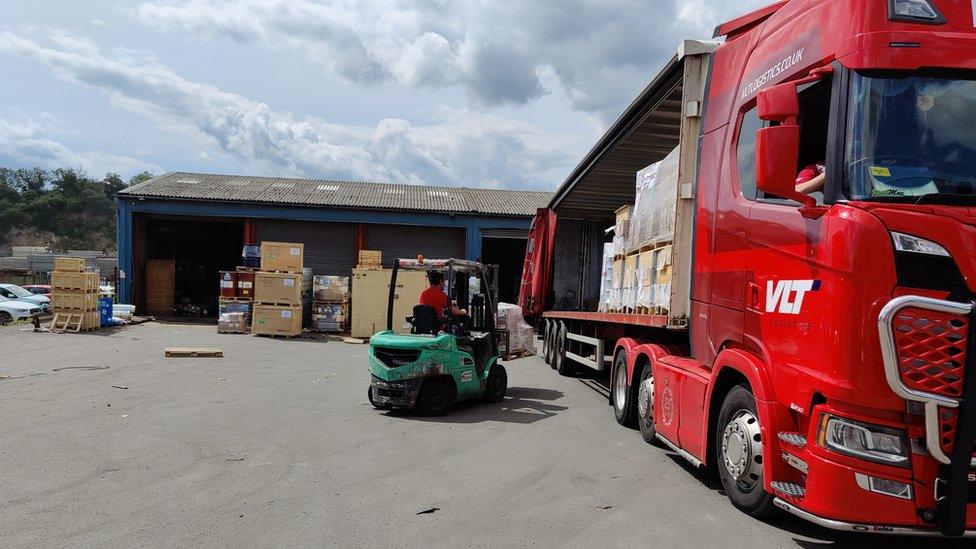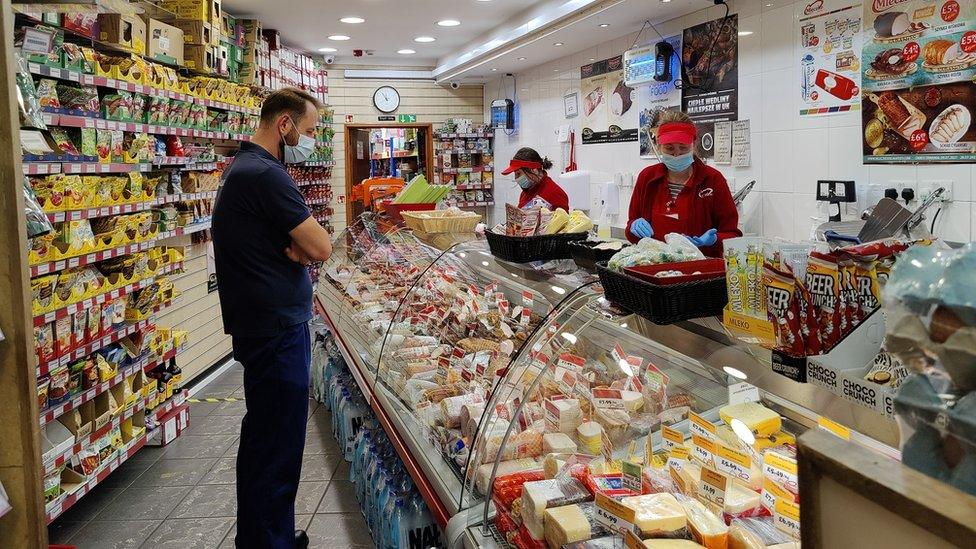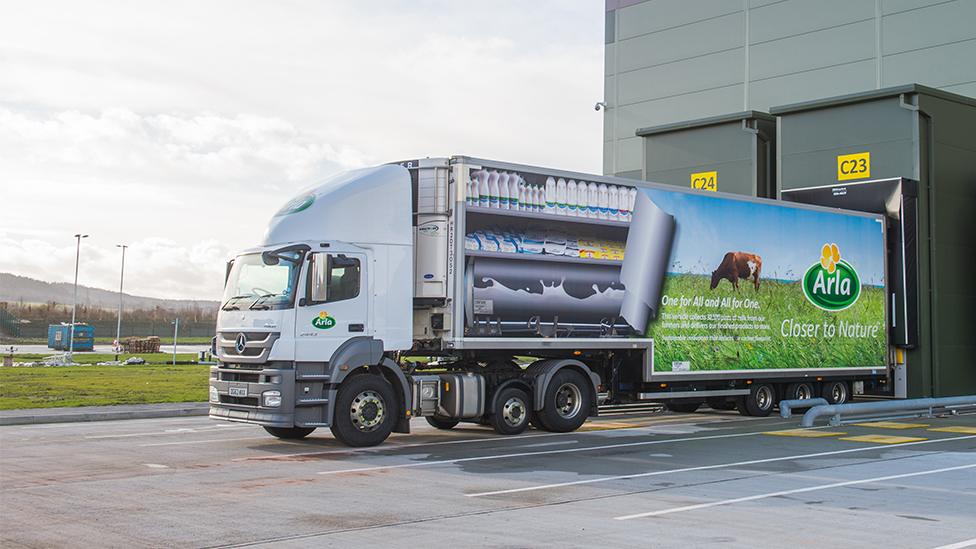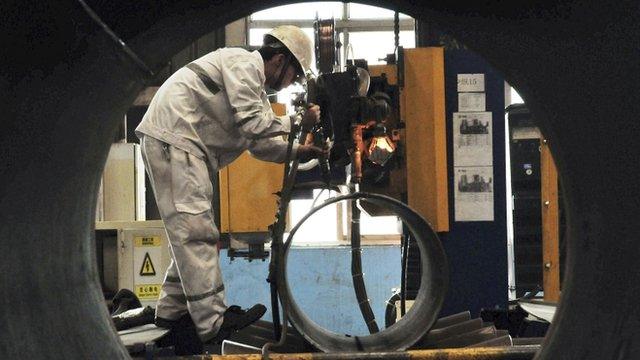Employee shortages: Where have all the workers gone?
- Published

The boss of Youngs Transportation says a lack of HGV drivers is made worse by a shortage to driver training test slots.
It's not often that economies face the disruption we've endured in the last year, and none of us should be surprised that it's taking the labour market a while to settle down.
But some are wondering whether Covid is triggering an historic rebalancing of power between the bosses and the workers.
No-one in their right mind would compare Covid to the Black Death, which wiped out enough of the workforce in the 14th Century for peasant labour to be in short supply, with the result that farm wages rose by several tens of percent over the following years. Covid has certainly not disrupted employment in anything so direct a fashion.
But pandemics can accelerate social and economic change. In particular, in the last year, Covid has prompted many foreign workers in the UK to return home to sit things out. We can't be sure all will choose to come back.
Anna Janczuk, the founder of a large Polish community organisation in Ealing, west London, told me that most of her close friends had moved back to Poland: "What they value is the close contact with their family. They re-evaluated their choices and priorities."
Add Brexit into the equation, and the old assumption that companies can just hire extra people from Eastern Europe to fill any gaps can no longer be taken for granted.
Jobs in surburbia
Anecdotally, Covid has also led to more than a few people to think about what matters to them and to retire early or to leave employment to start a business of their own. Economic "inactivity" has risen during the pandemic, as data from the Office for National Statistics highlights, external.
These are all developments that make life harder for employers, who would thus expect to pay more to find the workers they need - not just for the pandemic, nor for the pingdemic, but for ever after.

Economist Minouche Shafik says furlough kept people in existing jobs, stalling moves to the jobs of the future.
James Reed, chairman of Reed, one of the UK's biggest recruitment sites, told Radio 4's PM programme that pay for jobs in hospitality and catering had gone up 18% on the jobs advertised on their sites, and 14% for all jobs paying £25,000 or less.
No wonder people have suggested that in a post-Brexit, post-Covid world, worker power is back.
However, there is another theory as to what has been going on: that we are simply in a temporary post-pandemic rut, and normal service will resume before long. On this account, we haven't yet recovered from the spanner that Covid has thrown in the everyday workings of our labour market.
The argument goes like this: the pandemic has pulled the rug from certain kinds of activity, while pumping up demand elsewhere. It has switched demand for retail jobs to online shopping and delivery for example; it's taken jobs from city centre sandwich shops and put them in to the suburbs where you find people working from home.
According to Baroness Minouche Shafik, former deputy governor of the Bank of England, this was evidence of a K-shaped recovery.
"Some sectors are growing fast and need to employ people - other sectors are in decline and are probably not going to rehire the people that they might have shed during the pandemic", she said. "Furlough kept people in their current jobs as opposed to enabling people to move to where the jobs would be in future."
Historic pivot?
While unusually large changes have occurred in working patterns, it's easy to believe that furlough has put the labour market in suspended animation for much of the last year. The normal cogs that turn dying jobs into new ones have been thrown into a sticky syrup that has slowed everything down.
In an ordinary year, you might expect about one in ten workers to change jobs, with much more moving for the under-30s, external.
Who knows how many people who might have moved, felt it was better in 2020 to sit tight in a job - even on only 80% of normal pay in the Job Retention Scheme - than risking it and moving on elsewhere?

London's big Polish community spurred the opening food shops - but many people returned home during the pandemic.
If this account is right, it implies there will be shortages in the growing sectors, who can't get the staff, while workers bide their time before moving on.
Right now, I think it does make sense to assume this is what is happening: Unless there is a large permanent change to migration, we are simply in the pains of a pandemic exit right now, rather than an historic pivot towards labour.
The example of Covid disruption that struck me most, was on visiting haulage firm Youngs Transportation and Logistics, at Purfleet, Essex, where I spoke to director Rob Hollyman about the shortage of HGV drivers.
He told me there have long been shortages of drivers. But right now, while it takes as little as two weeks to train, there is a Covid-caused backlog of test slots. So even if someone wanted to get the licence, they'd have to wait.
We might still find there is a permanent fall-out from the pandemic - there may even be a change in the political climate around pay and conditions.
But all we know now is that it is a bumpy old time out there while workers and employers find their feet.
Related topics
- Published30 July 2021

- Published19 July 2016

- Published1 July 2021
